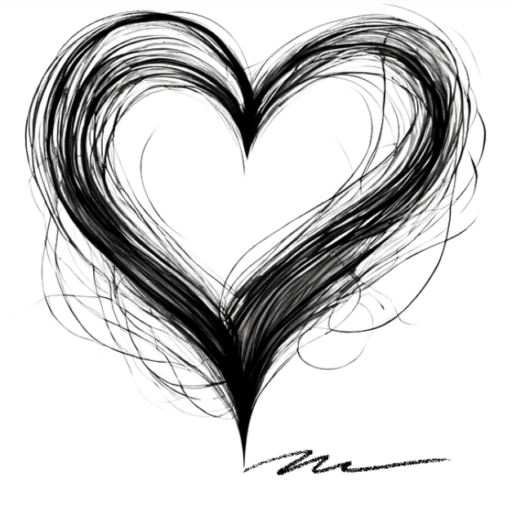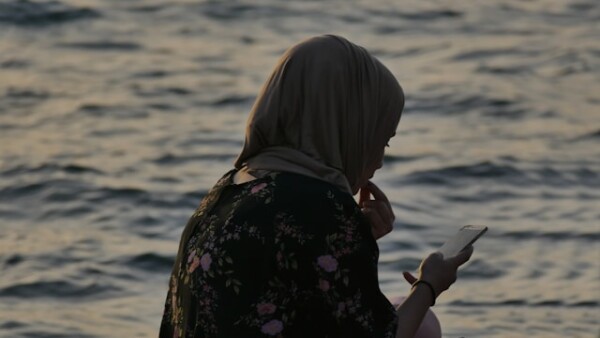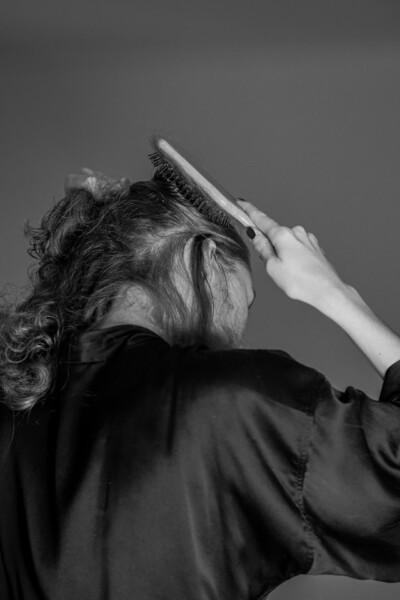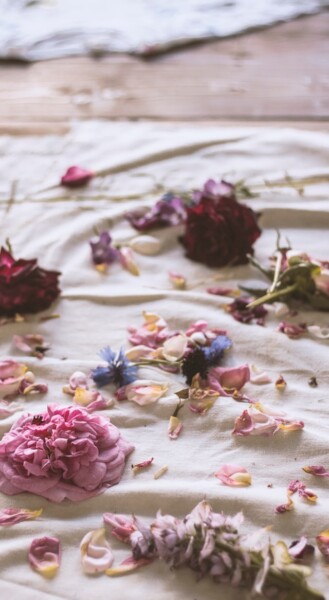I Should Have Known
Mama always tells me there’s nothing in this life worth crying for, but she cries every time I leave and every time I come back. Once, I asked her why when I returned to her home on a chilly November night after a month away, as she combed through the clothes in my oversized suitcase, staining them with her tears. “You’re the only person I’ve ever met who chooses the life of a refugee,” she teased. Guilt and shame bubbled up within me. I heard what she wasn’t saying. There were more clothes in my suitcase than in her nine-person household.
“Why do you always cry for me when nothing in this life is worth crying for?” I jibed to deflect my unease.
“Because my girl, God was so generous as to gift me an eighth child. Because, you donkey, love transcends this life.”
I don’t remember the first time I called her Mama, but she called me her daughter from the day we met. Maybe it was the night we washed dishes as her husband played cards with his friends in the living room, scraping coffee grounds and sugar from the bottom of doll-sized cups, icy water numbing our wrinkled hands. Or maybe the day she whistled and winked as a male friend picked me up in his red sports car, then giggled with me late into the night about an imagined “love meeting,” full of red and pink frilly dresses. We curated our own world when the one around us was hard to bear, but our love was something more, deeper than imagination and realer than blood.
Mama got used to skeptical looks from her Jordanian neighbors when she introduced her American daughter, their eyes softening as they agreed to play along. But Mama oiled and brushed my hair just like she did for her other daughters. When I was blinded by headaches in the middle of the afternoon, she tucked me into a twin bed beneath a Tom and Jerry comforter and brought me little white pills and water in a tin cup. I swallowed them without asking what they were, trusting her to parent me to health.
On a spring day, while the girls were at school, Mama and I wandered through a wildflower-stamped field at the edge of the village, plucking weeds to repurpose into fragrant meals. We filled baskets with leaves I couldn’t differentiate, then returned home, dirt caked beneath our nails, and baked them into savory pastries. When the girls got home, we ate our fill then shared the leftovers with the neighbors. “Give to others whenever you can, and know that when you need help, there’s no shame in receiving,” Mama mused as we brushed water across the kitchen floor that evening.
But Mama didn’t want gifts. I sought to give her small luxuries; things her broken teeth and weather-worn hands had never known. But she didn’t care about nights in hotels or spa days or sweaters to shield her from the bite of winter. “We’re simple people,” she said. “The beauty in this life comes not from what we have, but who we’re with.” We cancelled the massages and stuffed eggplant with walnuts instead.
One evening, gathered around a tray of cackling coals in the middle of her living room, she showed me how to make perfume. We concocted potions and sniffed their scents, until the cocktail of flowers in the air grew so potent, we could no longer distinguish one from the next. I rubbed lotion into her dry hands, massaging her callouses as she closed her eyes, a contented smile on her lips. After, she picked up a perfume bottle and it slipped from her fingers, shattering on the floor. I cut my hand as I picked up the shards. She pierced her own finger and held it to my palm. “Now no one can say we don’t share blood,” she smirked.
I was conflicted over whether blood was a good thing. She told me she loved me often but often wasn’t enough. I knew it was only a matter of time before she would discover I was unlovable. One night, I lay awake on a mattress on the floor of her living room, fan buzzing overhead on a scorching summer night, my birth mother’s words in my mind. I was eleven again, sitting in the front seat of her car as we drove past my neighbor’s blue semi-circular house. “You’re out of your mind if you think anyone’s ever going to love you.”
On a fall night, Mama and I washed dishes and spilled our secrets. “I regret that I got married so young. I was only fifteen,” she said, resting her hand on mine beneath the water. “But my biggest regret is that I let my daughter marry young. I should have given her a better life.” I dried my hands on a kitchen towel that had been one of the many gifts in my oversized suitcase. I wrapped my arms around her, clutching the towel behind her back, as she cried on my shoulder.
“She has a wonderful life,” I whispered. “She has a perfect life because it’s a life with you.”
Later in her bedroom, I mumbled my secret as we folded clean towels and arranged them in piles on the heavy blue quilt. The shame was old and familiar, rising to the point of overflow. I waited for her to tell me I was repulsive, dishonorable, unlovable. Instead, she caressed my hair and whispered, “It’s not your fault,” and then, “I love you.”
After I left Jordan and she returned to Syria, I picked fights with Mama, silly and childlike. She took out a ten-thousand-dollar loan for her son’s wedding. She wanted one of her daughters to marry a man she didn’t know. We exchanged biting words in voice notes across time zones, our raised voices never fully drowning out the heartbeat of explosions out her window. I ached for her from the comfort of my heated bedroom, debating with myself whether it would hurt more to lose her or to let her go. We ended every conversation with the same line. “I’m angry because I love you.”
The following year, I traveled the world. I studied Arabic in Lebanon, her home in Syria mere hours away but inaccessible, then moved to China for a master’s program. My classmates admired our lavish accommodations, private bedrooms and bathrooms that included a weekly cleaning service. I longed for Mama’s living room, a pile of girls giggling late into the night on mattresses on the floor. At my university’s holiday gala, I wore a spritz of Mama’s sticky sweet homemade perfume. As I swayed to the music with my classmates, I longed for the nights when Mama’s daughters and I had danced in her living room as she’d praised the closeness of her six daughters, and we’d pulled her in to join us for a song.
When we were evacuated from China at the start of the COVID-19 pandemic, my classmates mourned the loss of lectures from business executives and dinners with government officials, but I felt a guilty sense of relief. As I flew back to the U.S., coughing incessantly on an overnight flight, I realized that, at least in one way, I was like Mama. I lived for the simple things.
Mama and I spoke daily during the pandemic. Our video calls lasted hours, even when we had nothing to say. Sometimes, I sat on the plush couch in my living room as she shivered on a foam rubber mattress in front of a cement wall. Other times, we cooked together, Mama instructing me on how to make our favorite dishes with my poor substitutes for the required ingredients as she heated a pot of water atop her gas heater. Once, as I was boiling water for rice, her youngest daughters spotted a bunch of bananas on my counter and began to cry. “They haven’t had bananas since we got back to Syria,” Mama explained. “They cost eight dollars a kilo here.” She didn’t object when I sent her money the next day, just sent me photos of her daughters happily munching on bananas after she picked up the funds.
On another call that during that pandemic sprint, Mama informed her youngest daughter, Maha, four at the time, that I wasn’t her biological sister. “If she’s not my sister, then you’re not my mother,” Maha argued. Mama insisted it was true, but Maha wouldn’t hear of it. “My whole life is a lie,” she sobbed as she punched Mama in the arm with her tiny fist. “She is my sister. You’re the one I can’t trust.”
“I didn’t say she wasn’t your sister,” Mama said through a stifled laugh. “I just said she isn’t biologically related to you.” Maha didn’t know what biologically meant.
“I told you so,” Maha said to Mama, wiping her tears. “She is my sister. I can’t believe you forgot that.”
As my world reopened, our calls faded to weekly, my office job consuming the hours that had previously been ours. We searched for things to fight about, a rupture we could fortify to remain central in each other’s lives. We ran out of topics. My job was incomprehensible to her. Her world hadn’t changed. She cooked on the heater when there was no electricity, adopting my vegetarianism because meat was scarce and overpriced. Then one day, she told me she had a new dream. “Now that I’m home, I want to give Syria’s children the best life possible,” she said.
Last year, we founded a school together, Mama and me. I found grant funding and Mama hired three teachers who work alongside her to teach children to read and help them recover from trauma. We speak daily again, now about our project. We rarely fight these days. As we help the children heal, we’re healing ourselves.
Sometimes, I message her, forgetting it’s late at night in Syria. “I’ll check in the morning. Everyone is sleeping,” she says.
“Why aren’t you sleeping?”
“I was, but I heard my phone ding and knew it was you.”
I sing to her in a voice note, the children’s lullaby, yallah tnam, yallah tnam, that she sang to the whole family before bed when we shared a world in Jordan. “I love you,” she responds. We say it every day.
Years ago, I ended a friendship with someone who called her Mama days after I introduced them. I needed her to be mine, to affirm that our words meant something special. I was naïve then. I should have known from the first time she cried when I came back. She had claimed me from the start.

Melissa Diamond is a writer, humanitarian and social entrepreneur. Her short story, “More Than Seven Miles,” is forthcoming in Sinister Wisdom. She has lived in thirteen countries and now calls Virginia home.


